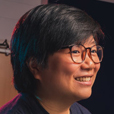View semester dates
2 years part-time

Craft sounds, reshape conventions
Year of entry: 2026 (September)
Whether you are a self-taught artist-producer who wants to make better recordings, or a trained recording engineer who wants to learn advanced techniques, this course will provide you with the critical thinking, listening and practical skills to realise your goals.
The MA Music Production & Audio Cultures programme provides a comprehensive education in critical listening and studio practices for musical recordings. Students engage with technologies ranging from various digital audio workstations to tape machines, analogue desks and advanced audio systems, including immersive formats. We're a Dolby Institute Academic Partner and have multiple Dolby Atmos facilities, as well as Ambisonic systems, preparing graduates for both traditional and emerging audio landscapes.
The curriculum balances theoretical lectures, listening seminars, and guided studio workshops taught by industry professionals and scholars. Students engage in various research methodologies, including perceptual listening tests, empirical studies and 'Practice as Research', culminating in a substantial research project in their chosen specialism. They complete their work in the well-equipped performance and recording facilities of the School of Arts and Creative Technologies. Students can benefit from the rich musical ecosystem within the wider Music Department, collaborating with performers, composers and researchers across diverse genres and traditions, creating valuable opportunities to record original material and develop lasting professional connections.

The course covers a range of theoretical and practical sessions, which allowed hands-on practice with a balanced analytical input. Recording opportunities are always available ranging from Classical, Jazz, and Experimental. This was really useful for increasing the sound palette and to engage in different collaborations.
You'll study a series of core modules and complete an extended research project.
You'll cover both aesthetic and scientific approaches to music production, explore the history and context of a variety of genres and develop the practical skills needed to capture and edit musical recordings.
Our modules may change to reflect the latest academic thinking and expertise of our staff, and in line with Department/School academic planning.
In the final stages of your course you'll complete a large-scale research project. This can take several different forms: you could produce a set of productions with accompanying commentaries, demonstrating either new practices and techniques or mimicking existing productions as a form of analysis; a dissertation analysing existing productions or developing and testing theories about aspects of production; or a combination of the two.
Previous research project titles include:
Every course at York is built on a distinctive set of learning outcomes. These will give you a clear understanding of what you will be able to accomplish at the end of the course and help you explain what you can offer employers. Our academics identify the knowledge, skills, and experiences you'll need upon graduation and then design the course to get you there.
The freedom to do what I wanted, mixed with amazing equipment and staff who genuinely care about your development really helped set me up on the path I'm on now.
| Study mode | UK (home) | International and EU |
|---|---|---|
| Full-time (1 year) | £13,900 | £32,900 |
| Part-time (2 years) This is the year 1 fee. Fees for future years are subject to confirmation. |
£6,950 | £16,450 |
Students on a Student Visa are not currently permitted to study part-time at York.
For courses which are longer than one year, the tuition fees quoted are for the first year of study.
UK (home) or international fees? The level of fee that you will be asked to pay depends on whether you're classed as a UK (home) or international student. Check your fee status.
Find out more information about tuition fees and how to pay them.
Discover your funding options to help with tuition fees and living costs.
We'll confirm more funding opportunities for students joining us in 2026/27 throughout the year.
If you've successfully completed an undergraduate degree at York you could be eligible for a 10% Masters fee discount.
We are pleased to work with Chevening Scholars to offer funding for our Masters programmes. Chevening Scholarships provide one year of fully-funded postgraduate study in the UK for international (including EU) students. The scholarships are open to early and mid-career professionals who have the potential to become future leaders.
You’ll work with world‐leading academics who’ll challenge you to think independently and excel in all that you do. Our approach to teaching will provide you with the knowledge, opportunities, and support you need to grow and succeed in a global workplace.
Teaching is delivered via lectures, listening seminars (held in our renowned Rymer auditorium) and practical workshops. In addition to scheduled module sessions, you are encouraged to attend a range of extracurricular activities that take place in the School, ranging from research presentations and workshops, ensemble rehearsal and performances, concerts, masterclasses and panel sessions.
Our School is home to the Music Research Centre, containing a large-scale neutral listening and performing space built to extremely low noise specifications (PNC15); a linked studio suite containing a large live space with configurable acoustics, large control room with an SSL Duality console and a composition suite featuring Moog, Eurorack, EMS and Yamaha synthesis.
The Sir Jack Lyons Concert Hall has a dedicated studio control room along with a suite of other studios. The Ron Cooke Hub has further recording and mixing suites, featuring SSL, Manley, Neve, Mäag and other hardware facilities. You'll have access to a wide range of equipment, including microphones, recording hardware/software and computing facilities for practical work and research. We have multiple stereo and immersive monitoring options across the facilities.
Discover our facilities
You will be based in the School of Arts & Creative Technologies on Campus East and West. Almost all of your teaching will take place within the School.
Our beautiful green campus offers a student-friendly setting in which to live and study, within easy reach of the action in the city centre. It's easy to get around campus - everything is within walking or pedalling distance, or you can always use the fast and frequent bus service.
You'll largely be assessed through production portfolios, supported by commentaries where applicable, as well as essays and your own choice of format in the extended research project.

What I loved about York was that I was able to take learning into my own hands. I chose to do an international record production project, which took me on a crowdfunded album project to Colombia. While on this trip I learned what it was to truly manage and produce artists on my own project, and I discovered a new type of self-confidence in being able to produce my own truly unique vision.
This course will provide you with a versatile skill-set which will be of value for both entrepreneurs or for those seeking professional appointments, be it with a small independent production house or a broadcaster with global reach. You will graduate with a set of robust skills which will transfer to many different scenarios along with a breadth and depth of understanding of Music Production which will allow you to create meaningful and significant audio content, as well as critically analyse the work of other producers.
| Qualification | Typical offer |
|---|---|
| Undergraduate degree | 2:2 or equivalent in Music or another relevant subject. We will also consider unrelated first degrees provided you can demonstrate a good grasp of music theory and some practical ability in music making. |
| Other international qualifications | Equivalent qualifications from your country |
Provide a statement (maximum 750 words) describing your musicianship, previous experience with audio technologies, and specific topics that you would like to research during your studies. You may also want to enclose an academic paper that you have written for your previous degree.
Following your application, you will be contacted to submit a short portfolio of 2 music tracks (no longer than 10 minutes in total) that you recorded/produced, edited, and mixed, with a written commentary (maximum 500 words) including the tracks' credits and describing your workflow.
We expect the tracks to be non-compressed (.wav format). If you do not have access to an Internet connection that enables you to upload non-compressed files, you can submit mp3 (320kb/s) files.
If English isn't your first language you may need to provide evidence of your English language ability. We accept the following qualifications:
| Qualification | Minimum requirement |
|---|---|
| IELTS (Academic and Indicator) | 6.5, minimum 6.0 in each component |
| Cambridge CEFR | B2 First: 176, with 169 in each component |
| Oxford ELLT | 7, minimum of 6 in each component |
| Oxford Test of English Advanced | 136, minimum 126 in each component |
| Duolingo | 120, minimum 105 in all other components |
| LanguageCert SELT | B2 with 33/50 in each component |
| LanguageCert Academic | 70 with a minimum of 65 in each component |
| Kaplan Test of English Language | 478-509, with 444-477 in all other components |
| Skills for English | B2: Merit overall, with Pass with Merit in each component |
| PTE Academic | 61, minimum 55 in each component |
| TOEFL | 87, minimum of 21 in each component |
| Trinity ISE III | Merit in all requirements |
For more information see our postgraduate English language requirements.
You may be eligible for one of our pre-sessional English language courses. These courses will provide you with the level of English needed to meet the conditions of your offer.
The length of course you need to take depends on your current English language test scores and how much you need to improve to reach our English language requirements.
After you've accepted your offer to study at York, we'll confirm which pre-sessional course you should apply to via You@York.
Get in touch if you have any questions



